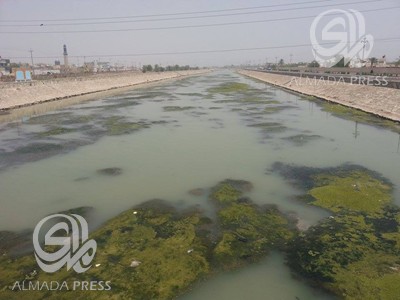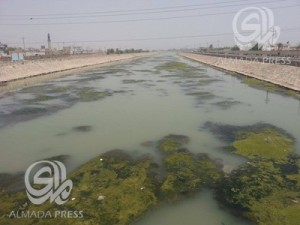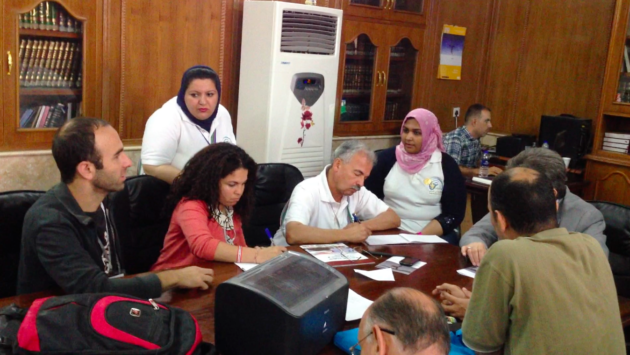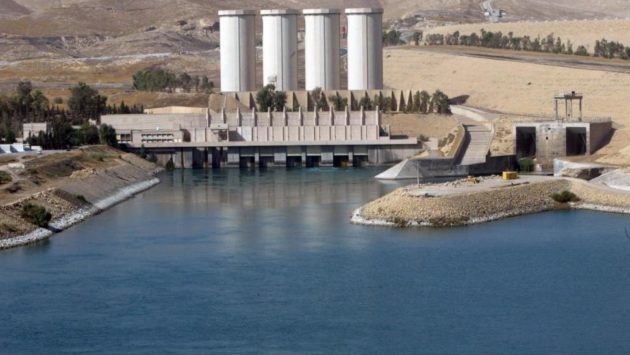Water Scarcity in Iraq: Residents of Al-Majar Al-Kabeer: “Our river is becoming a swamp of algae and waste”
Translated by ICSSI
ِAugust 27 , 2014
Residents of the Al-Majar Al-Kabeer district in the southern province of Maysan, complained on Thursday about water scarcity and about the river that passes through the district becoming a breeding ground for algae and a repository for waste. Lack of sufficient potable, clean water has caused many to resort to using the river water for drinking and washing — despite the fact that it is wholly unsuitable for consumption. Officials called on the new Iraqi government to negotiate with Turkey over water rights, warning the Iraqi government that they risk an “economic, environmental and humanitarian disaster” due to the scarcity of water in all the provinces.
In an interview with Al-Madaa Press, Rahim Abdul-Zahra Al-Serai, a citizen of the Al-Majar al-Kabeer district, said that “what is happening now in the district of Majar Al-Kabeer (30 km south of the city of Amarah), indicates that the region will soon be faced with an environmental disaster — the current water shortages are transforming the river passing through into a series of swamps and pools which are heavily polluted with algae and waste water.”
Al-Serai (45 years old) added, “the Tigris River, which flows through the Al-Majar Alkabeer district, was one of the rivers that was known for its strong flow, eventually pouring into the area of Al-Wadia where one finds vast marshes, making a rich and sustainable environment for agriculture and fishing”. He noted that “after 2003, the river levels started to go down and the clear water became dirty”.
He pointed out that “the people of the district once used this river for drinking and washing, and now it is a swamp, surrounded by dirt and empty water bottles. This pollution forms a clear danger to the lives of citizens”.
In another interview with Al-Madaa Press, an expert in the field of Economic and Water Affairs, Mohammed Fenjan, called on the new Iraqi government to “negotiate with Turkey”, which has been using water as leverage to secure its other interests in Iraq. The Iraqi government, he claims, must “prioritize the issue of clean water, or Iraq will soon face an economic, environmental and humanitarian disaster due to water scarcity in all the cities of Iraq”.
He continued that “if the water crisis is left without concrete solutions for the immediate future, Iraq will face terrorism of another kind: in addition to the bloody and violent terrorism we now see, this new terrorism will kill the citizens slowly, depriving them of water, an essential element in the sustainability of all life”.
A member of the provincial council in Maysan, Sarhan Al-Ghalibi reported to Al-Madaa Press that, “Al-Majar Al-Kabeer and all the areas near it have suffered a significant shortage of water because one of the branches of the Tigris River that passes through the district has turned into a pool of algae”. He called on governmental departments relating to irrigation and water resources to “take the lead role in cleaning the river because of the enormous risks created given a continued lack of clean, flowing water”.
He stressed that “the government needs to take a the initiative in finding quick solutions to this urgent problem if it wishes to save the lives of citizens who now face disease and an increased threat of epidemics, all caused by the desperate use of non-potable water, which is not even fit for washing”.
On April 6, 2014, the Commander in Chief of the Armed Forces, Noori Al-Maliki, said that ISIS (DAAESH), and the Baathists, and “orphans of the former regime in Fallujah, cut off water from the central and southern regions,” and stressed that this act was “devoid of honor and courage”. Maliki threatened to “use all his power to save the lives of people and agricultural land.” He called on citizens, especially the people of Anbar, to “assume their legal and national responsibilities to support the security forces, and as a result the security forces managed to open the dam in Fallujah and to restore the water flow to normal”.
It is noteworthy that water levels in the Tigris and Euphrates have fallen significantly over the past few years (according to the Ministry of Municipalities, they are as low as half of what they were in 2012). As a result, Iran, Turkey and Syria have reduced the flow of water to Iraq, or cut water delivered to Iraq, or diverted its direction. All of this greatly affects the Iraqi economy, and in particular, the agricultural sector, which forms a large proportion of it. It has also led to the deterioration of water quality and to raised rates of pollution and salinity, which in turn has had a negative impact on the environment and increased disease.




